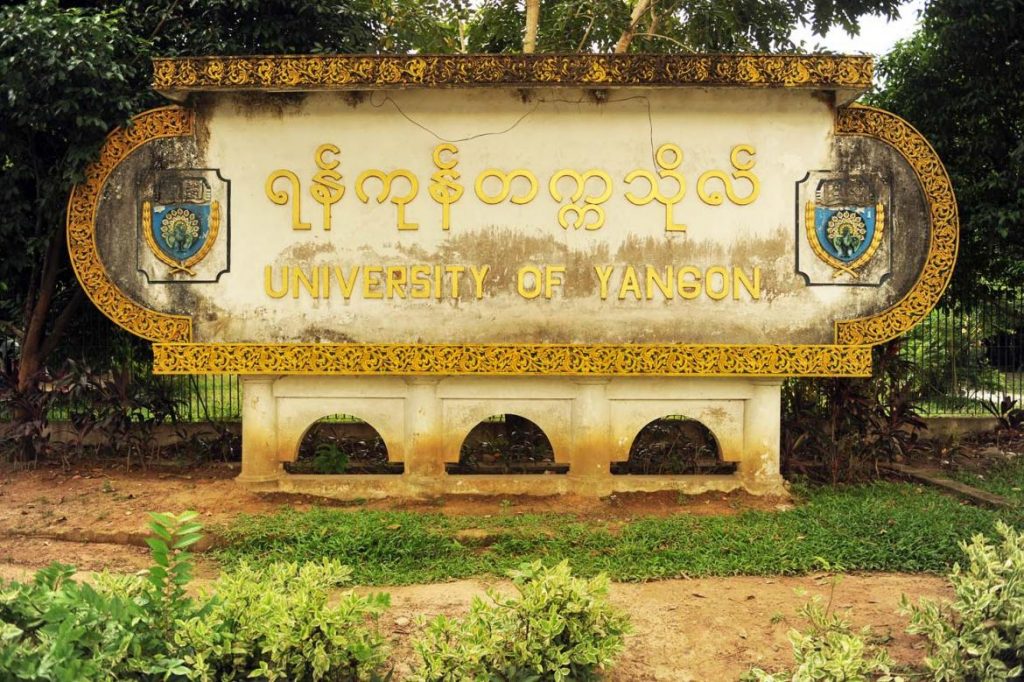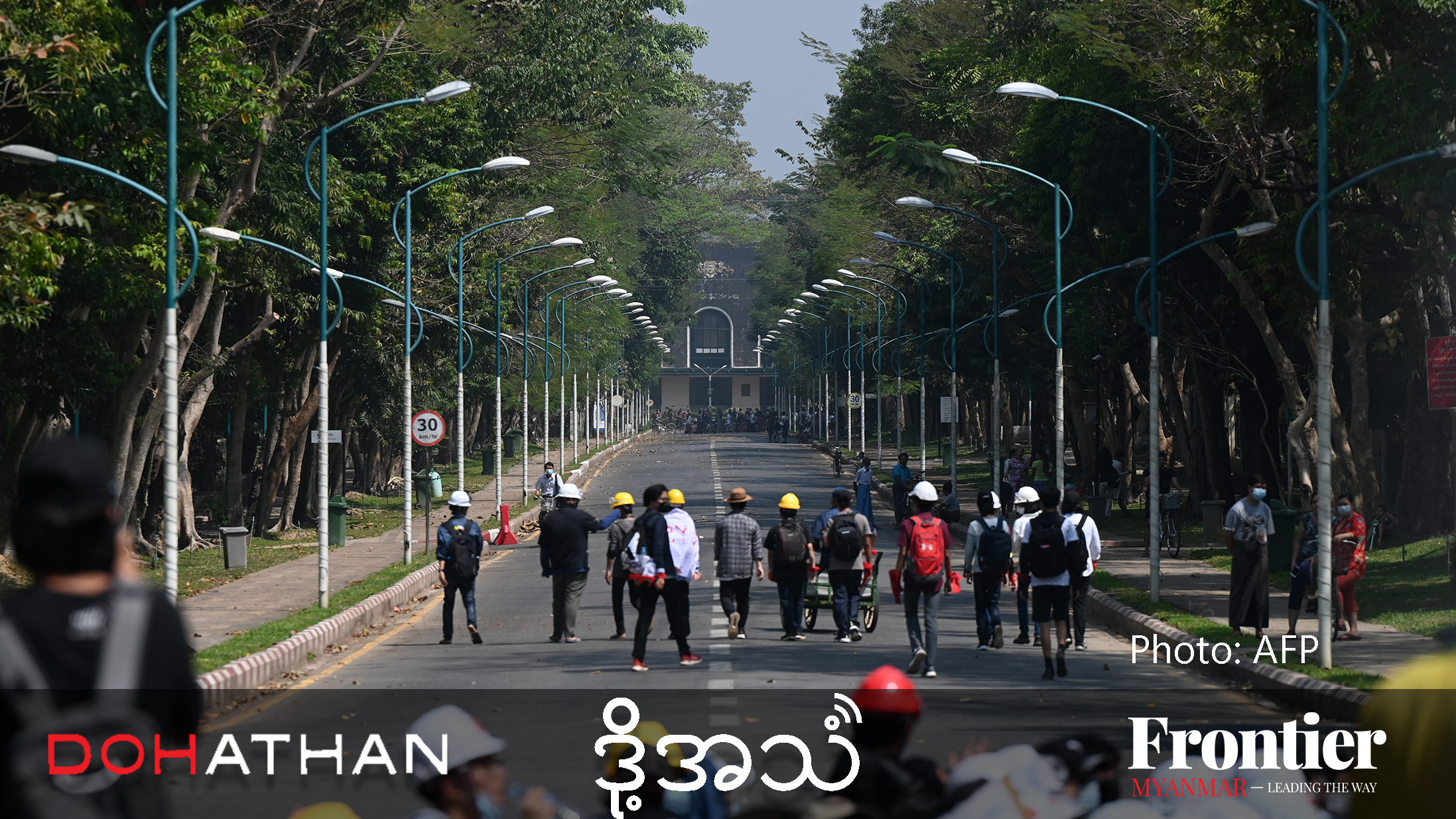Students at Yangon University have launched a campaign against sexual harassment on campus and hope it will receive more support from the administration.
By WIN ZAR NI AUNG | FRONTIER
A GROUP of students at Yangon University has launched a campaign against sexual harassment in response to a number of incidents on its sprawling campus in recent months.
In January, members of the group applied stickers to buildings in the campus that provide information about laws on sexual harassment and included an invitation to attend an event to discuss the issue.
The group, which has around 20 members, says the campaign is aimed at stopping sexual harassment on campus by raising awareness about it.
The campaign was launched after a taxi driver verbally harassed a female student and she wrote about the experience in a social media post. After she was criticised for her post by other women on a Yangon University Facebook group, the Yangon University Students Union intervened and arranged meetings to discuss the problem, inviting all students who wanted to stop sexual harassment. In the meetings, they agreed to form the group to combat the problem on campus, working together with the student union.
Support more independent journalism like this. Sign up to be a Frontier member.
Ko Phone Htet Naing, 21, a member of Yangon University Students Union, said various forms of sexual harassment had been taking place at the university since bachelor courses reopened in the 2013-14 academic year.
“There is teasing and touching the body in the private area, and it is still happening because the responsible persons have not acted decisively to stop it; I want them to take effective action this time,” Phone Htet Naing told Frontier.
He said 90 students, including some men, had shared experiences of sexual harassment in a survey conducted on campus that was posted on Facebook at the end of January.

Students post stickers at Yangon University to promote an event aimed at combating sexual harassment on campus. (Supplied)
As well as forming the group to raise awareness and discuss the issue on campus, the students behind the campaign have also held talks with the university’s administration.
Group member Ma Zin Bo Htike, 20, said its activities were well supported on social media but female students were sometimes reluctant to join activities held on campus.
Zin Bo Htike said she hoped for more cooperation from them in the future.
“Girls are always silent and they don’t talk about their experiences,” she said. “I’ve heard other girls talking about our movement and they said they would not complain if they were victims. These girls are blaming the victims.”
Zin Bo Htike said some female students claimed that the group was turning a small problem into a big one.
Most harassment occurs in public, for instance when women are walking near teashops, crossing roads and travelling on buses. Student Ma Su Myat Noe, 24, said some women, including herself, deal with harassment by ignoring it.
“I ignore it when boys tease me because I think [their behaviour shows] they are of bad moral character,” she said, adding that one reason why she never responds is because “I’m used to these words”.
Ko Tun Min, 28, a motorbike taxi driver in Insein Township, said he sometimes teases “beautiful girls” because it makes him happy.
“I don’t really think about it too much … I’ve already forgotten about it a few minutes later,” he said. “I look at the girls and think whether they look like they will talk back. If not then I tease them; most are shy and afraid, so they don’t say anything.”

The Yangon University Students’ Union is working together with a group of students to fight harassment on the sprawling campus. (Steve Tickner | Frontier)
Under section 354 of the Penal Code, it is illegal to offend a women “with intent to outrage her modesty”, and the maximum penalty is two years’ in prison and a fine. Section 509 makes it an offence to use words, gestures or acts with the intention of “insulting the modesty of a woman”, and is punishable by up to a year in prison.
Ma Htar Htar, director and founder of gender equality group, Akhayar Women, said the laws against sexual harassment were strong but victims did not know how to take effective action against violators. “People don’t know the process clearly; they don’t know how to provide proof or what they need to prove,” Htar Htar told Frontier. Another problem was witnesses, whose testimony can be crucial but who do not want to appear in court. “Some women say that the harassment is only teasing, that the victims were not raped, and for that reason people do not want to be witnesses.”
Htar Htar said few cases go to court because many victims prefer to reach a resolution by seeking the assistance of ward administrators.
Women’s rights activist Ma Phyo Let Han said some men harassed women because they derived mental satisfaction from playing gender power games. “One group wants to have power over another group,” she said.
Phyo Let Han was sharply critical of victim blaming.
“It is important to know that if society blames the victims, it is as bad as the perpetrators. The public should cooperate to stop the harassment because people need to understand that it is shameful,” she told Frontier.
Phyo Let Han said classes should be introduced in schools to raise awareness about sexual harassment and there should also be awareness campaigns aimed at the general public. She also called for public debates to discuss the issue.
Meanwhile, the group at Yangon University says it has made some progress after meeting the administration. The group has established a hotline to report sexual harassment and the lighting on the campus is being improved. It is planning more activities on campus but Phone Htet Naing said the campaign still has many challenges to overcome. The group wanted a long-term plan to address the issue, but the administration’s response had been short term. “And the stickers we put up in areas where they would attract the most attention have been removed,” he said.







